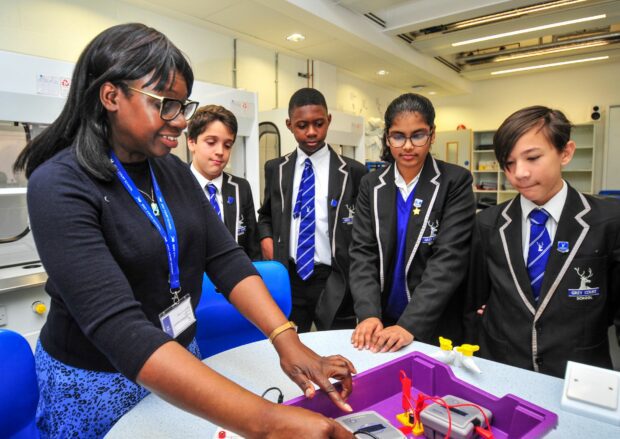
Curious about what’s it like being an Inspector (also known as Her Majesty’s Inspectors)? Two school HMI talk about their journey into the role and what the job involves.
Sue Costello HMI
I joined Ofsted as one of Her Majesty’s Inspectors in January 2020. Before this I was the director of inclusion for a multi-academy trust and also a contracted Ofsted Inspector (OI). I enjoyed inspecting primary, special and independent schools for six years. In 2019, I was particularly inspired by the introduction of the education inspection framework (EIF), so joining Ofsted as an HMI was a natural next step for me.
Since becoming an HMI, I have grown professionally at a rapid pace. I am fortunate to work with supportive colleagues who have inspired and challenged me to get involved in wide-ranging projects. For example, I am using the knowledge and skills gained from my degree specialism in special educational needs by training myself to lead inspections of local area special educational needs provision. Recently, I have been working with policy and HMI colleagues to consider the way Ofsted inspects English – the subject I have always been ambitious about. I have a varied background in education which has prepared me well for the role of HMI. I was a lecturer and senior leader in further education for eleven years before training as a primary school teacher. I used my expertise in English to support a local authority to raise standards in schools. I held several teaching and leadership positions (including headteacher) in primary, secondary and special schools in the North East and South West.
Working for Ofsted has enabled me to make an impact across more areas of education. For example, I was a team member on two methodology visits to explore the future initial teacher training (ITE) inspections. This allowed me to develop my wider understanding of the different remits that we inspect. Through this role, I am privileged to have helped shape ITE inspection methodology and practice.
I am proud to work for Ofsted. Being an HMI gives me the opportunity to make a contribution to standards of education nationally, ultimately improving children’s and young people’s lives. It is a truly rewarding job.
Ahmed Marika’s perspective
My path to becoming an HMI started with me working as a chartered accountant! It was a good job, but my passion for education and improving the lives of children was always burning brightly. I was a governor at my local school, then eventually made the life-changing career move into teaching and have never looked back. I really enjoyed my time working in schools, but wanted to stretch myself further and make an impact across more areas of education.
I became a contracted Ofsted Inspector and enjoyed doing this dual role for four years. This greatly benefitted me as a school leader and helped to improve my own school. I was hugely impressed by the HMI and Senior HMI I worked with on inspection: I was taken by their ability to make sound, and often difficult, judgements that were rooted in evidence and that would stand up to challenge. applied to become an HMI so I could use my knowledge, skills and experience gained from being an Ofsted Inspector to carry out a wide range of inspection activities – and because my personal values aligned so closely with Ofsted’s.
Since becoming an HMI three years ago, I have experienced so much. It is such a varied and challenging role, but one with the clearest purpose. In addition to leading secondary, primary, special, independent and all-through inspections, I have also teamed on initial teacher education (ITE) and inspection of local authority children’s services (ILACS) inspections. I was also given the great opportunity of leading the first multi-academy trust (MAT) summary evaluation in the North West. No school-based role ever gave me such exposure across the education sector.
Do I miss teaching? Yes, of course! It is one of the most rewarding jobs possible. But the satisfaction I get from helping to raise education standards across a wide range of providers (and ultimately improve the lives of children across England) more than offsets it. It is a privilege to be one of Her Majesty’s Inspectors.
Why work for Ofsted?
Ofsted’s work is fulfilling and varied. Working from home in between inspections and face-to-face meetings, you will benefit from the freedom and flexibility that comes with working independently, while supported by a network of colleagues who share your passion for making a difference in England’s schools.
Under our education inspection framework (EIF) you will have a full day allocated to write up your inspection report, as well as increased time to prepare for inspection.
HMI’s support each other. Each HMI is allocated to a regional team and supported by an experienced senior leader in that region. After a comprehensive induction and training period, regional team colleagues stay in regular contact, providing advice and support. This means they form close bonds that prove invaluable throughout their careers.
You may also in future become a specialist adviser, move into inspector training, join a policy team or become a senior HMI leading a team. You could take on additional research work or manage a project. We want inspectors to have the best current knowledge and practice in subjects as part of our development programme.
Future leaders
We welcome applications from a variety of backgrounds and have run regional shadowing programmes in the past. As we return to inspection fully, we hope to start these programmes up again.
Here, our Regional Director for London, Mike Sheridan, reflects on why these programmes matter.
In 2019 we launched a development programme for future leaders. We are aware that the inspection workforce in London does not accurately reflect the ethnic and cultural diversity of the region we serve. It’s important to us that both inspectors and school leaders in London schools accurately reflect the region’s ethnic and cultural diversity.
In other developments, we recently met to discuss how we can facilitate shadowing opportunities for colleagues in the sectors where we inspect who are from black or minority ethnic groups. It was a dynamic meeting where people went away, came up with plans and strategies, and are working now to come up with some materials. Look out for more news about our plans to encourage colleagues from the widest of backgrounds to come and experience our work in Ofsted, and, we hope, apply to come and work with us one day in the future.
Benefits
We offer a generous salary, starting at £70,500 rising quickly to £75,500 after probation, paid travel and expenses, an excellent pension, generous holiday entitlement of 32.5 days and in-year performance rewards along with other attractive benefits.
You’ll need a degree-level qualification or equivalent and hold Qualified Teacher Status. You’ll have minimum 5 years’ experience of successful leadership at middle or senior level with responsibility for people and resource management, and a proven track record of achieving consistent improvement in the education sector
Apply at our recruitment site: https://resourcing.ofsted.gov.uk/
